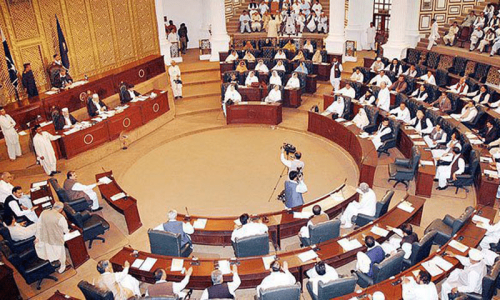HARDLY any election in Pakistan has been free of controversy. This includes Senate elections. The recent presidential election was a rare exception. Mahmood Khan Achakzai, the runner-up and joint candidate of the Sunni Ittehad Council (SIC) — read: PTI — displayed political maturity and a democratic spirit by accepting defeat and congratulating the winner, Asif Ali Zardari of the PPP. Not just that, he went on to acknowledge that it had been a clean election in which, unlike the past, no cash for votes was involved.
Less than a month later, it was a different story in the case the election of half the Senate. Unlike in the past, there were no allegations of legislators voting for cash — a significant improvement given the background of Pakistan’s Senate polls — some serious constitutional and legal controversies arose, which continue to rage even after the winners have been notified.
The major controversy concerns the ECP’s unprecedented move to postpone election in the KP provincial assembly, literally at the eleventh hour, despite the fact that election in the three other provinces and the federal capital had been held smoothly.
KP is the only province where the PTI commands an absolute majority in the provincial assembly and has been able to elect its own chief minister, even though the ECP doesn’t recognise PTI as a parliamentary party and continues to treat its legislators as independent members. The ECP refused to hold election in the KP Assembly on the same day they were held in the other legislatures because its Speaker refused to administer oath to some 25 legislators elected on seats reserved for women and non-Muslim minorities belonging to various other political parties.
These were the seats which would have been won by the PTI, or its proxy SIC, had the ECP accepted the PTI or SIC as a bona fide party in the assembly, which qualifies the allocation of reserved seats in proportion to the general seats won in the election. The PTI is somehow resigned to the fact that these seats can’t be given to the party but finds it absolutely unacceptable for the seats which were its right to be distributed among its opponent parties.
Some serious constitutional and legal questions have arisen in the aftermath of the Senate polls.
In an odd and rather unfair interpretation of the law, some of these parties have bagged more seats reserved for women and minorities than they had secured in the general election. For example, the JUI-F had won seven general seats in the KP Assembly in the Feb 8 election but was able to get 10 reserved seats. The PML-N and PPP, which secured five and four general seats, were awarded eight and six reserved seats respectively.
Sadly, for the PTI, the ECP decision, no matter how unfair it might seem to the party, was unanimously endorsed by a five-member bench of the Peshawar High Court, and the Speaker was directed to administer oath to members ‘elected’ on the reserved seats. Since administering oath to ‘elected’ members can be done only in an assembly session, and the Speaker has no legal mechanism to call one on his own — he can do so only if at least 25 per cent of the members requisition a session — the assembly session could not be convened and oath to the members elected on reserved seats could not be administered.
In these circumstances, only the provincial government has the authority to give binding advice to the governor to summon an assembly session. The governor tried to summon the assembly session on his own but both the provincial government and the assembly secretariat justifiably frustrated his effort on constitutional grounds. In fact, the high court, in its order, should have directed the provincial government, and not the Speaker, to summon the session.
At stake, besides a principle, are at least four additional Senate seats which the opposition could win if these 25 legislators took oath and voted for their party nominees. The matter is now before the Peshawar High Court for the latter to hear the Speaker’s petition to review the court order endorsing the ECP notification. The court will hear the case after it has delivered its detailed judgement. The matter may ultimately be resolved by the Supreme Court. How long it will take is anybody’s guess.
Will the Senate, without 11 representatives from KP, be able to function as usual and elect its chairman and deputy chairman? The key question in this respect is whether the Senate is ‘duly constituted’ in accordance with Article 60 of the Constitution. There is nothing in the law or Constitution which suggests that the Senate is not duly constituted. It has full representation of the three provinces and the federal capital. The fourth province, KP, is also not without representation as the term of half its senators elected in 2021 is set to expire in March 2027.
Some analysts have suggested that the Senate in its present form can function under an ‘interim presiding officer’ but it can’t elect its regular chair and deputy chair. Again, there is nothing in the Constitution, Elections Act, 2017, or the Senate Rules of Procedure which stops the Upper House from electing its chairman and deputy chairman. Although, legally speaking, the Senate is “duly formed”, it will be rather unfortunate if half the representatives of a province remain missing from this important forum which has been specifically created to safeguard the provinces’ rights.
One hopes that the Peshawar High Court and the Supreme Court (if required) will move expeditiously not only to conclusively pronounce on these contentious points but also to interpret the law for the future.
The writer is the president of Pakistan-based think tank, Pildat.
X: @ABMPildat
Published in Dawn, April 8th, 2024















































Dear visitor, the comments section is undergoing an overhaul and will return soon.